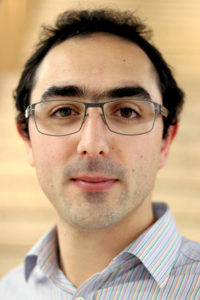This year, our partners the Institution of Chemical Engineers (IChemE), jointly awarded their Junior Moulton Medal to two sets of recipients for their respective works, both published in MSDE. The Junior Moulton Medal is awarded to the early-career author, or authors, of the most meritorious papers published by IChemE in the last year.
One set of this year’s recipients are David Danaci, Mai Bui and Niall MacDowell from Imperial College London for their paper “Exploring the limits of absorption-based CO2 capture using MOFs with PVSA – from molecular design to process economics”.
 David Danaci is a research associate at the Department of Chemical Engineering, Imperial College London. His research is a combination of experimental work (materials synthesis to pilot-scale), process modelling, and techno-economic analysis. He currently works on adsorption-based separations for CO2 capture, and has previously investigated other applications including O2 production, and natural gas sweetening. He also has experience with other gas separation technologies including physical and chemical absorption, and cryogenic distillation. He has also worked on heterogenous reaction processes including methanol and dimethyl ether production for CO2 utilisation, and H2 production via methane reforming. David is also a member of the Education Committee of the International Adsorption Society.
David Danaci is a research associate at the Department of Chemical Engineering, Imperial College London. His research is a combination of experimental work (materials synthesis to pilot-scale), process modelling, and techno-economic analysis. He currently works on adsorption-based separations for CO2 capture, and has previously investigated other applications including O2 production, and natural gas sweetening. He also has experience with other gas separation technologies including physical and chemical absorption, and cryogenic distillation. He has also worked on heterogenous reaction processes including methanol and dimethyl ether production for CO2 utilisation, and H2 production via methane reforming. David is also a member of the Education Committee of the International Adsorption Society.
 Mai Bui is a senior research associate in the Centre for Environmental Policy at Imperial College London and co-leads the Clean Fossil and Bioenergy Research Group with Professor Niall Mac Dowell. She has experience designing demonstration tests in pilot plants, operating and modelling CO2 capture plants in Australia, the UK and Norway. Her research focuses on evaluating the potential of different CO2 capture technologies in the context of power, industry and negative emission applications (e.g. bioenergy with CCS and direct air capture).
Mai Bui is a senior research associate in the Centre for Environmental Policy at Imperial College London and co-leads the Clean Fossil and Bioenergy Research Group with Professor Niall Mac Dowell. She has experience designing demonstration tests in pilot plants, operating and modelling CO2 capture plants in Australia, the UK and Norway. Her research focuses on evaluating the potential of different CO2 capture technologies in the context of power, industry and negative emission applications (e.g. bioenergy with CCS and direct air capture).
 Niall MacDowell is a Professor in Energy Systems Engineering at Imperial College London. He is a Chartered Engineer, a Fellow of both the IChemE and the Royal Society of Chemistry. His research is focused on understanding the transition to a low carbon economy. Since receiving his PhD 2010, he has published more than 150 peer-reviewed scientific papers at the molecular, unit operation, integrated process, and system scales in this context. A full list of publications can be found here and he currently serves on the Advisory Board of Joule. Niall has more than a decade’s experience as a consultant to the public and private sectors. He has worked with a range of private sector energy companies, and has provided evidence to members of the Select Committee on Energy and Climate Change and has given advice to DECC/BEIS, the UK’s National Infrastructure Commission, the IEA, the IEAGHG the ETI and the JRC. Niall is a member of Total’s Scientific Advisory Board, was also a member of the US National Petroleum Council (NPC) CCUS Roadmap Team. Niall has been a member of the technical working group of the Zero Emissions Platform (ZEP), the Carbon Capture and Storage Association (CCSA) and from 2015 – 2019 served as the Secretary of the IChemE’s Energy Centre. Finally, Niall was awarded the Qatar Petroleum Prize for his PhD research in 2010 and the IChemE’s Nicklin and Junior Moulton medals for his work on low carbon energy in 2015 and 2021, respectively.
Niall MacDowell is a Professor in Energy Systems Engineering at Imperial College London. He is a Chartered Engineer, a Fellow of both the IChemE and the Royal Society of Chemistry. His research is focused on understanding the transition to a low carbon economy. Since receiving his PhD 2010, he has published more than 150 peer-reviewed scientific papers at the molecular, unit operation, integrated process, and system scales in this context. A full list of publications can be found here and he currently serves on the Advisory Board of Joule. Niall has more than a decade’s experience as a consultant to the public and private sectors. He has worked with a range of private sector energy companies, and has provided evidence to members of the Select Committee on Energy and Climate Change and has given advice to DECC/BEIS, the UK’s National Infrastructure Commission, the IEA, the IEAGHG the ETI and the JRC. Niall is a member of Total’s Scientific Advisory Board, was also a member of the US National Petroleum Council (NPC) CCUS Roadmap Team. Niall has been a member of the technical working group of the Zero Emissions Platform (ZEP), the Carbon Capture and Storage Association (CCSA) and from 2015 – 2019 served as the Secretary of the IChemE’s Energy Centre. Finally, Niall was awarded the Qatar Petroleum Prize for his PhD research in 2010 and the IChemE’s Nicklin and Junior Moulton medals for his work on low carbon energy in 2015 and 2021, respectively.
Read their Junior Moulton Medal winning paper “Exploring the limits of absorption-based CO2 capture using MOFs with PVSA – from molecular design to process economics”. This article is part of our collection MSDE for the 2021 MSDE Symposium and all articles are FREE to read until 15 July.
Research Associate David Danaci has kindly answered some questions for us.
Your Moulton Medal winning paper focuses on MOF design for CO2 capture. In your opinion, what are the most important questions to be asked/answered in this field of research?
Tens of thousands of MOFs have been synthesised, but only a handful are being pursued for selected applications. The practical information required to evaluate the performance of nearly all of these materials (for any application) does not exist.
In this regard, comprehensive computational studies have been carried out over the past few years by other research groups. An opportunity now exists to experimentally validate those results for the top performing materials, and ascertain other factors such as stability towards moisture and impurities, and long-term cyclic stability. Conversely, studies like ours, and others that have also been published, have identified key properties that should be displayed by materials for good CO2 capture performance, i.e., post-combustion conditions. The question that arises is whether materials can now actually be rationally designed to meet those criteria. Progress in either avenue would be valuable to the adsorption, and CO2 capture fields.
Aside from the focus on adsorbents, there are still many questions around the best adsorption process design for a given CO2 capture application. Any adsorption-based separation is a combination of adsorbent and process selection, so it cannot be overlooked. Further research in this area is required in order to investigate avenues for cost reduction.
What aspect of your work are you most excited about at the moment?
There is a portfolio of different CO2 capture technologies (e.g. absorption, adsorption, membranes) and a range of different applications. There are still many questions to be answered around the optimum process designs and techno-economic analysis. Related to that, although amine absorption is a viable CO2 capture technology in the vast majority of cases, there are some instances where it may not be the cost optimal solution. Identifying where adsorption processes will be the most effective is an area of interest, particularly with respect to the other capture technologies.
Aside from CO2 capture for climate change mitigation, there are also many other separations which are of industrial importance that have not received as much attention to date. Specifically, rare gas separation, alkane-olefin separation, and low-energy alternatives to distillation processes. So, there are still many other applications to investigate in the future.
What do you find most challenging about your research?
In the context of evaluating new adsorbents for CO2 capture, the biggest limitation is availability of the necessary experimental data which are inputs to process modelling. Previously, there has not been a sensible approach in selecting candidate materials from the thousands of alternatives to perform these measurements on; however, the computational work mentioned earlier has narrowed down that search space. Process design and modelling can be carried out on conventional adsorbents for which sufficient data is available, however, the outcomes are adsorbent-specific so the findings cannot be translated to other adsorbents.
Specifically in the context of MOFs, a MOF may have been synthesised once off with crystals obtained to perform x-ray diffraction, and submitted as a new material to the database. However, reproducibility is rarely investigated. Therefore, although computational studies may indicate good performance based on that crystallographic data, it may be difficult or impossible to reproduce the material in sufficient quantity to carry out the required measurements.
In which upcoming conferences or events (online or in person) may our readers meet you?
We will be attending the 2021 MSDE Symposium between the 17th and 18th of June, FEZA2021 Virtual between the 5th and 9th of July, and the AIChE Virtual Annual Meeting between the 15th and 19th of November.
Register for FREE before 3 June for the 2021 MSDE Symposium!










